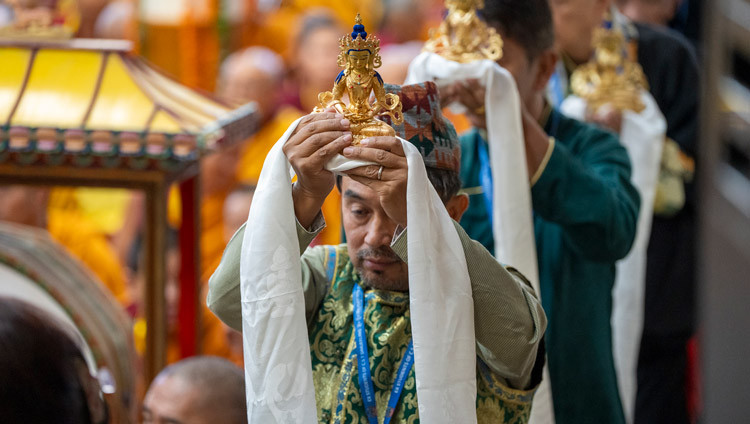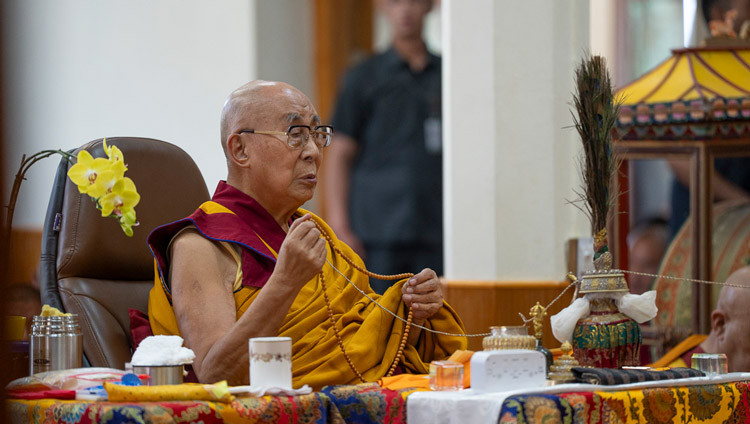Children in Crossfire Discuss – ‘Educating the Heart’
September 11, 2017
“In a modern democratic society the media have an important role to educate and inform the people. When I meet Chinese friends, I tell them 1.3 billion Chinese have a right to know what’s going on and once they do, they have the ability to judge right from wrong. Consequently, the censorship they face is morally wrong. In a free country, the media exercise an important role.
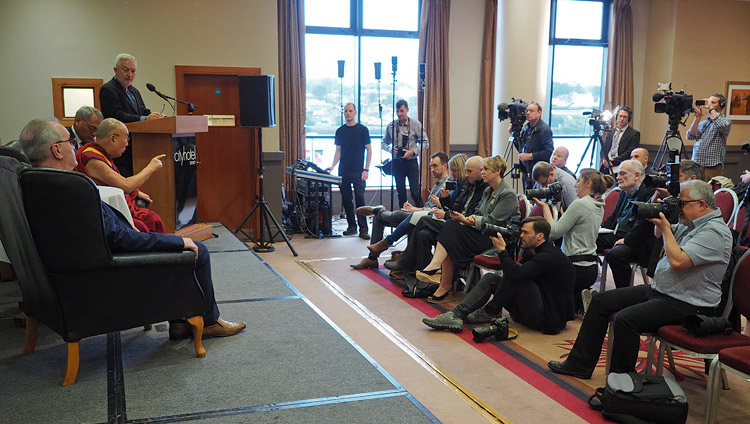
“I have three major commitments. I’m just one human being, but I believe each one of us has a responsibility to contribute to a happier humanity. I am committed to promoting human values. As a Buddhist monk I’m also dedicated to inter-religious harmony. As a Tibetan, I am concerned to preserve Tibetan Buddhist culture, as well as protecting the natural environment and ecology of Tibet.”
Questions began with His Holiness being asked if he had one wish, what it would be—and what makes him sad. He replied that he’d like to see a more peaceful world, less conflict and the role of weapons in human life reduced. Peace, he said, will only really be created through dialogue. He cited the situation in Yemen and what’s happening to the Rohingyas in Burma as things that make him sad, because both are cases of man-made suffering to which there is a human solution.
Regarding the Northern Ireland peace process he declared that every country belongs to its people, so what happens to the peace process will also depend on the people.
He described Richard Moore as an example to us all. “While I only talk, he’s actually engaged in putting compassion into action. And this follows on his transforming the tragedy that befell him into something beneficial to other children.”
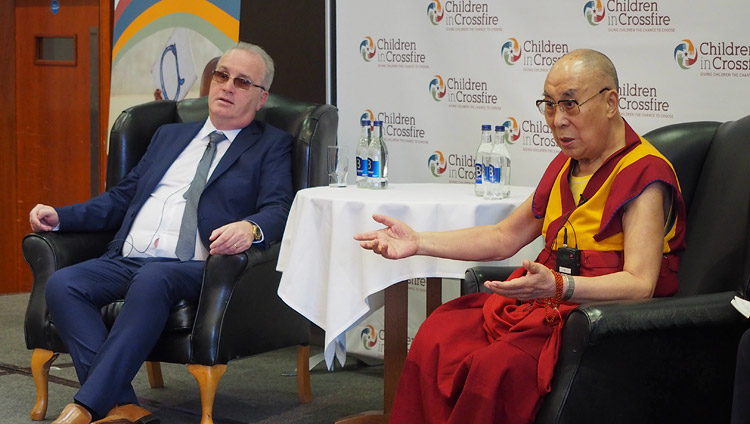
Pressed to say how he would advise those involved in the crisis over North Korea, he remarked that since he was unsure that the protagonists employed common sense, it would be difficult to give them advice. However, he stated that Putin’s assertion of the need for talk was correct. To make a further show of force would not only not solve the problem, but would probably result in tremendous suffering in South Korea and Japan.
“The use of nuclear weapons is unthinkable. We must seriously aim to achieve a nuclear free world. Indeed, our long term goal should be a demilitarized world. I don’t expect to see it in my lifetime, but we must make it our goal.”
Illustrating the importance of His Holiness’s support for Children in Crossfire’s initiatives, Richard Moore explained that the theme of today’s conference—Educating the Heart—arose directly from His Holiness’s comments in 2011. He added that he looked forward to a time when there is no need for Children in Crossfire, but in the meantime its aim is to reduce suffering so children have the chance to build a better life for themselves. He thanked His Holiness for his friendship and support.
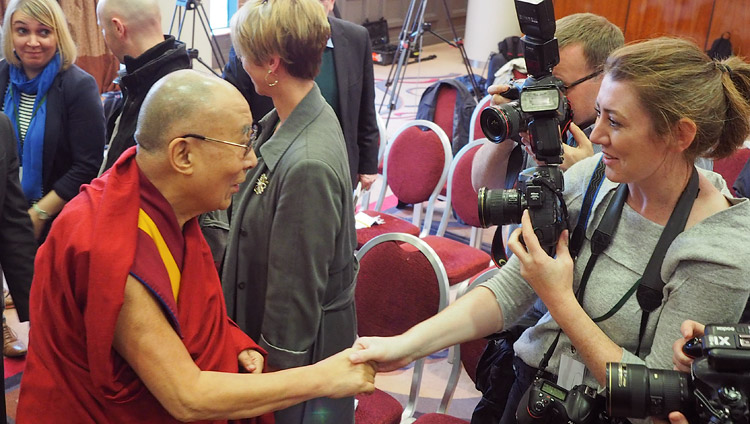
His Holiness shook hands with many of the journalists before leaving for the Millennium Forum to attend the conference. In his introduction to the event, Richard Moore reported that celebrations of Children in Crossfire’s twentieth anniversary had been planned for some time. In its ten year involvement in Tanzania and Ethiopia, it has realized a need for more pre-school education and the importance of better trained teachers.
In his address, His Holiness recalled the almost continuous cycle of violence he has witnessed since he was born, from the outbreak of the Sino-Japanese conflict and Second World War through to the more recent crises in Iraq and Afghanistan.
“Thinking about the world today,” he said, “although basic human nature has been shown to be compassionate, still there is so much suffering that is of our own making. Why? Because our education system is inadequate in not paying sufficient attention to human values. When we are under the sway of attachment and anger we are disturbed and unable to exercise our intelligence properly. Therefore, we need a clearer understanding of the workings of our mind and emotions.
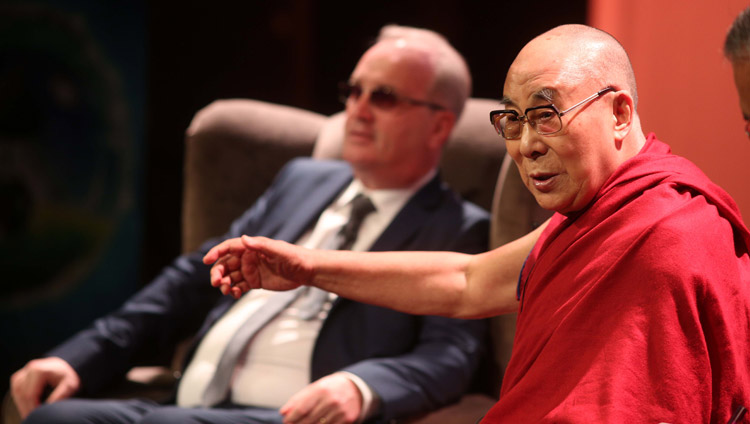
“Until now, Asia has learned about science and technology from the West, but now there’s also a possibility of the West learning from Asia about the mind. What is clear is that technological developments alone fail to ensure peace of mind. So we must make modern education more complete.
“The last century, for all its achievements, was too fraught with violence. As I’ve just said to the press, our aim should be a demilitarized world and yet we continue to produce and sell more weapons. Conflicts in the Middle East and the Korean Peninsula are entangled with emotions and a sense that problems can be solved by the use of force. We have a duty to inform those who are young today, the generation of the future, that such old thinking is out of date. However, if they make an effort to adopt a different approach right now, a more peaceful world may emerge in the future. I don’t expect to see it, but I’ll keep an eye on them all the same.”
Questions were invited from the floor and the first came with the suggestion that just as it’s commonly accepted that maths be compulsory, educating the heart should also be compulsory. His Holiness accepted the proffered curriculum for three to five year olds and mentioned the need for greater coordination of such initiatives.
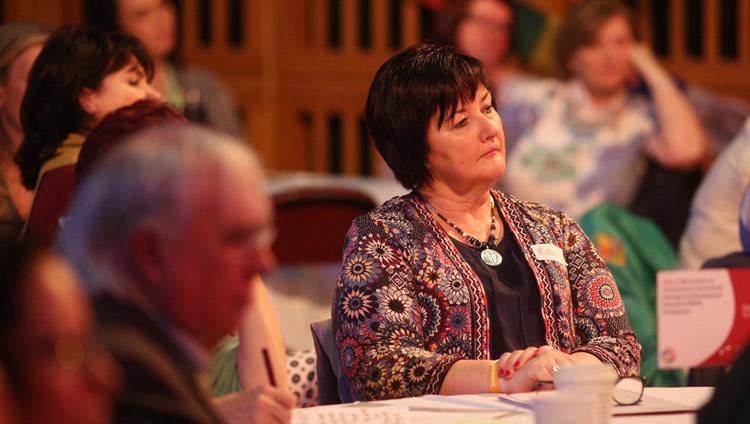
Asked how to make western psychologists better acquainted with the ancient Indian understanding of the workings of the mind and emotions, His Holiness mentioned the work being done by the Mind & Life Institute over the last 30 years to come to terms with the Buddhist explanation of six primary minds and 51 mental factors. He made reference to the rigorous studies undertaken in Tibetan monasteries, and lately in nunneries too, based on the traditions of India’s Nalanda University.
Questioned about training in compassion, His Holiness was clear that the use of human intelligence is crucial. He recommended that programs for training teachers be based on scientific findings, common sense and common human experience.
With regard to teaching about gender equality His Holiness explained his view of human development and the historic emergence of a need for leadership for which the criterion was physical strength. This is what led to male dominance. Availability of education has restored a sense of equality and now a time has come when the leadership of women, who are more sensitized to the sufferings of others, is what we need. He speculated that if more of the nearly 200 countries in the world were led by women, the world would be a more peaceful place.
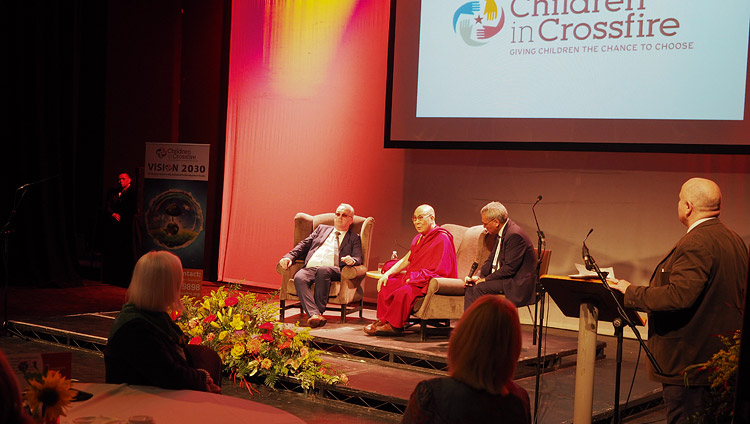
Finally, His Holiness noted that a lot of the problems we face arise because we get too caught up in secondary differences among us. He stressed the need to focus instead on the oneness of humanity.
The morning event came to an end when Mary Kabati from Tanzania presented a gift to His Holiness on behalf of Children in Crossfire. As usual, His Holiness shook hands and interacted directly with several of the conference participants as he left the stage.
Meeting with Tibetans and supporters of the cause of Tibet after lunch, His Holiness reviewed the achievements of nearly 58 years in exile. He also recalled the original establishment of the Nalanda Tradition in Tibet after King Trisong Detsen had invited the erudite Shantarakshita to the Land of Snows. He encouraged his listeners always to be proud of being Tibetan and to take whatever opportunities they have to tell other people about Tibet. He assured them that following medical treatment a year ago he is fine and in good health. He admitted that his knees give him some trouble, but mentioned learning that this is something he shares with the Fifth Dalai Lama.
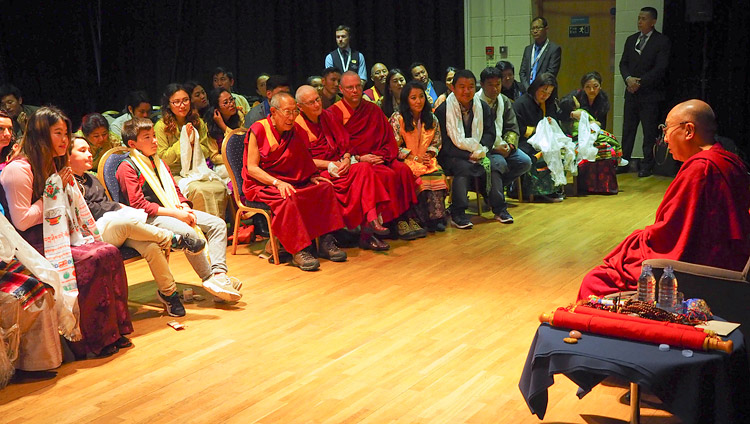
When the Tibetans and their friends gathered around him for photographs to be taken he again encouraged them to study and keep their use of the Tibetan language alive.
The sun was shining as His Holiness returned to his hotel. Tomorrow he will leave Derry to fly to Frankfurt, Germany.
Source: https://www.dalailama.com/news/2017/children-in-crossfire-discuss-educating-the-heart



